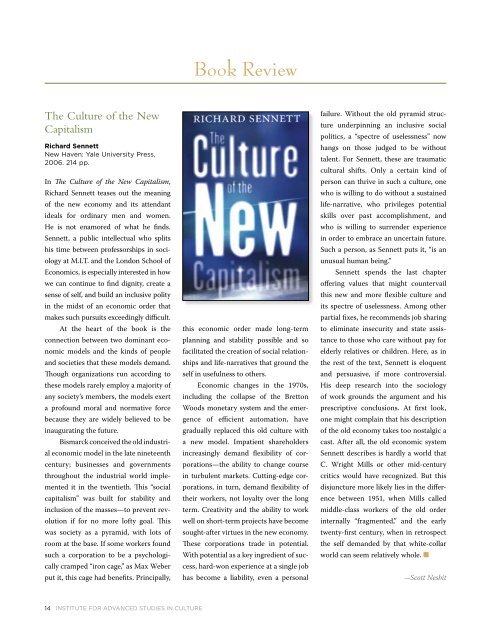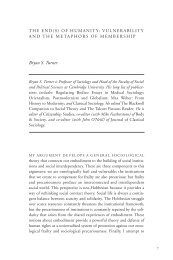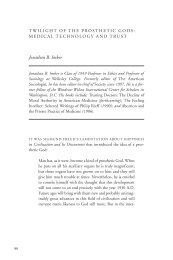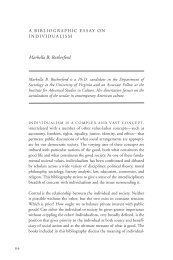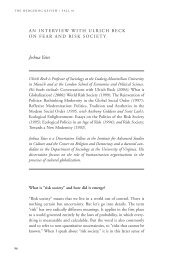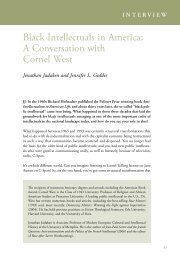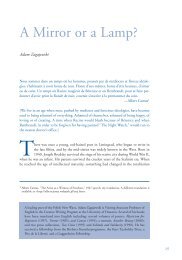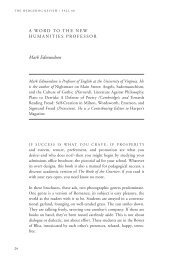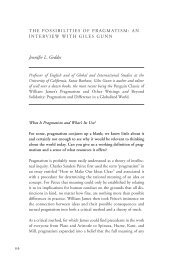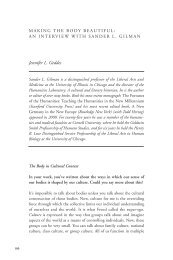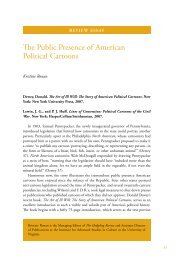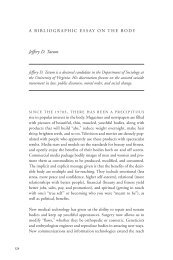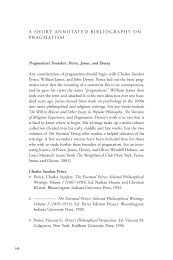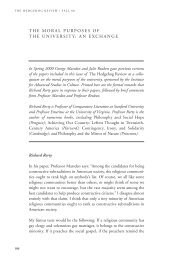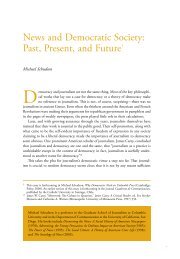ambiguous distinctions - Institute for Advanced Studies in Culture
ambiguous distinctions - Institute for Advanced Studies in Culture
ambiguous distinctions - Institute for Advanced Studies in Culture
You also want an ePaper? Increase the reach of your titles
YUMPU automatically turns print PDFs into web optimized ePapers that Google loves.
Book Review<br />
The <strong>Culture</strong> of the New<br />
Capitalism<br />
<br />
<br />
<br />
In The <strong>Culture</strong> of the New Capitalism,<br />
Richard Sennett teases out the mean<strong>in</strong>g<br />
of the new economy and its attendant<br />
ideals <strong>for</strong> ord<strong>in</strong>ary men and women.<br />
He is not enamored of what he f<strong>in</strong>ds.<br />
Sennett, a public <strong>in</strong>tellectual who splits<br />
his time between professorships <strong>in</strong> sociology<br />
at M.I.T. and the London School of<br />
Economics, is especially <strong>in</strong>terested <strong>in</strong> how<br />
we can cont<strong>in</strong>ue to f<strong>in</strong>d dignity, create a<br />
sense of self, and build an <strong>in</strong>clusive polity<br />
<strong>in</strong> the midst of an economic order that<br />
makes such pursuits exceed<strong>in</strong>gly difficult.<br />
At the heart of the book is the<br />
connection between two dom<strong>in</strong>ant economic<br />
models and the k<strong>in</strong>ds of people<br />
and societies that these models demand.<br />
Though organizations run accord<strong>in</strong>g to<br />
these models rarely employ a majority of<br />
any society’s members, the models exert<br />
a profound moral and normative <strong>for</strong>ce<br />
because they are widely believed to be<br />
<strong>in</strong>augurat<strong>in</strong>g the future.<br />
Bismarck conceived the old <strong>in</strong>dustrial<br />
economic model <strong>in</strong> the late n<strong>in</strong>eteenth<br />
century; bus<strong>in</strong>esses and governments<br />
throughout the <strong>in</strong>dustrial world implemented<br />
it <strong>in</strong> the twentieth. This “social<br />
capitalism” was built <strong>for</strong> stability and<br />
<strong>in</strong>clusion of the masses—to prevent revolution<br />
if <strong>for</strong> no more lofty goal. This<br />
was society as a pyramid, with lots of<br />
room at the base. If some workers found<br />
such a corporation to be a psychologically<br />
cramped “iron cage,” as Max Weber<br />
put it, this cage had benefits. Pr<strong>in</strong>cipally,<br />
this economic order made long-term<br />
plann<strong>in</strong>g and stability possible and so<br />
facilitated the creation of social relationships<br />
and life-narratives that ground the<br />
self <strong>in</strong> usefulness to others.<br />
Economic changes <strong>in</strong> the 1970s,<br />
<strong>in</strong>clud<strong>in</strong>g the collapse of the Bretton<br />
Woods monetary system and the emergence<br />
of efficient automation, have<br />
gradually replaced this old culture with<br />
a new model. Impatient shareholders<br />
<strong>in</strong>creas<strong>in</strong>gly demand flexibility of corporations—the<br />
ability to change course<br />
<strong>in</strong> turbulent markets. Cutt<strong>in</strong>g-edge corporations,<br />
<strong>in</strong> turn, demand flexibility of<br />
their workers, not loyalty over the long<br />
term. Creativity and the ability to work<br />
well on short-term projects have become<br />
sought-after virtues <strong>in</strong> the new economy.<br />
These corporations trade <strong>in</strong> potential.<br />
With potential as a key <strong>in</strong>gredient of success,<br />
hard-won experience at a s<strong>in</strong>gle job<br />
has become a liability, even a personal<br />
failure. Without the old pyramid structure<br />
underp<strong>in</strong>n<strong>in</strong>g an <strong>in</strong>clusive social<br />
politics, a “spectre of uselessness” now<br />
hangs on those judged to be without<br />
talent. For Sennett, these are traumatic<br />
cultural shifts. Only a certa<strong>in</strong> k<strong>in</strong>d of<br />
person can thrive <strong>in</strong> such a culture, one<br />
who is will<strong>in</strong>g to do without a susta<strong>in</strong>ed<br />
life-narrative, who privileges potential<br />
skills over past accomplishment, and<br />
who is will<strong>in</strong>g to surrender experience<br />
<strong>in</strong> order to embrace an uncerta<strong>in</strong> future.<br />
Such a person, as Sennett puts it, “is an<br />
unusual human be<strong>in</strong>g.”<br />
Sennett spends the last chapter<br />
offer<strong>in</strong>g values that might countervail<br />
this new and more flexible culture and<br />
its spectre of uselessness. Among other<br />
partial fixes, he recommends job shar<strong>in</strong>g<br />
to elim<strong>in</strong>ate <strong>in</strong>security and state assistance<br />
to those who care without pay <strong>for</strong><br />
elderly relatives or children. Here, as <strong>in</strong><br />
the rest of the text, Sennett is eloquent<br />
and persuasive, if more controversial.<br />
His deep research <strong>in</strong>to the sociology<br />
of work grounds the argument and his<br />
prescriptive conclusions. At first look,<br />
one might compla<strong>in</strong> that his description<br />
of the old economy takes too nostalgic a<br />
cast. After all, the old economic system<br />
Sennett describes is hardly a world that<br />
C. Wright Mills or other mid-century<br />
critics would have recognized. But this<br />
disjuncture more likely lies <strong>in</strong> the difference<br />
between 1951, when Mills called<br />
middle-class workers of the old order<br />
<strong>in</strong>ternally “fragmented,” and the early<br />
twenty-first century, when <strong>in</strong> retrospect<br />
the self demanded by that white-collar<br />
world can seem relatively whole. <br />
—Scott Nesbit


